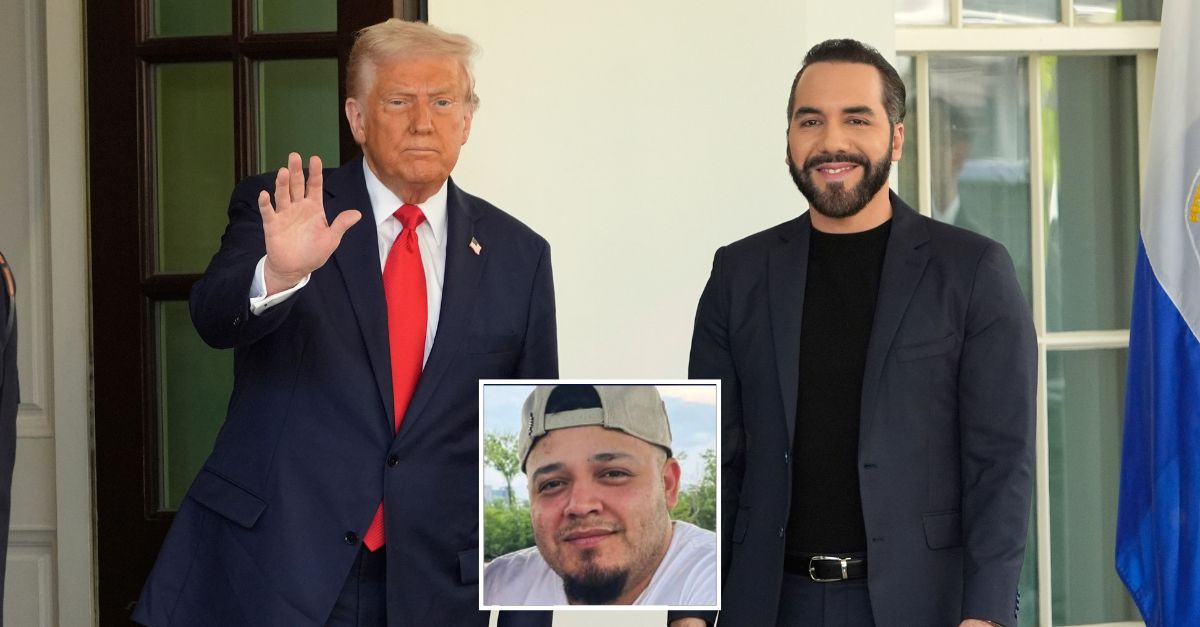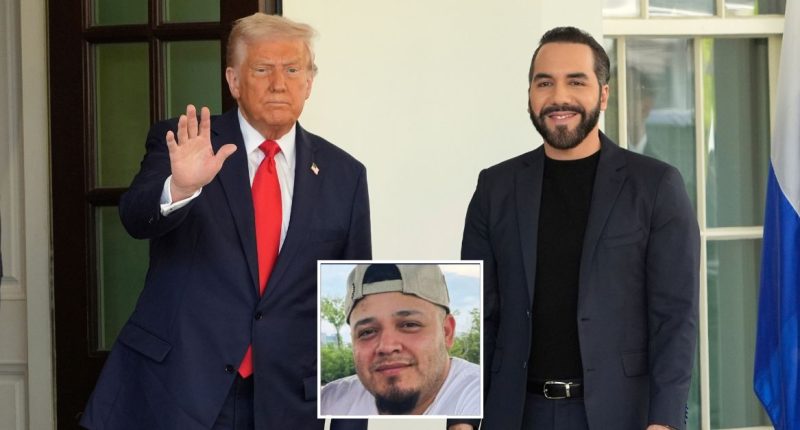
Main: President Donald Trump, left, waves as he greets El Salvador’s President Nayib Bukele as Bukele arrives at the White House, Monday, April 14, 2025, in Washington (AP Photo/Manuel Balce Ceneta). Inset: Kilmar Abrego Garcia in an undated photo (CASA).
The Trump administration dug in its heels on Tuesday, defiantly telling a federal judge that if the Maryland father she ordered returned to the U.S. after he was mistakenly deported to a terrorist prison in El Salvador were to come back to the country, he would be swiftly detained and removed again. An attorney for the Department of Homeland Security filed the sworn declaration minutes before a hearing in the case of Kilmar Abrego Garcia began.
“I have been authorized to represent that if Abrego Garcia does present at a port of entry, he would become subject to detention by DHS,” the declaration states. “In that case, DHS would take him into custody in the United States and either remove him to a third country or terminate his withholding of removal because of his membership in MS-13, a designated foreign terrorist organization, and remove him to El Salvador.”
The administration’s declaration was filed shortly after attorney for Abrego Garcia accused the Justice Department of flouting orders from the U.S. Supreme Court and U.S. District Judge Paula Xinis instructing the government to return Kilmar Abrego Garcia to the United States.
The three-page filing alleges that Trump administration officials have been intentionally misconstruing court orders since Abrego Garcia was deported in “error” in March under President Donald Trump’s unprecedented use of the Alien Enemies Act of 1798 (AEA), a wartime authority only previously invoked three times, the last of which was during World War II.
Specifically, the filing homes in on the government’s interpretation of the word “facilitate” in orders from both the Supreme Court and Xinis.
The high court on Thursday largely upheld Xinis’ prior order requiring the Trump administration to “facilitate” Abrego Garcia’s release from the Salvadoran work prison.
Xinis subsequently ordered the Justice Department to inform her on the status of Abrego Garcia as well as the steps the DOJ has taken and plans to take to “facilitate” his return to the U.S., but the Trump administration has been outwardly defiant, repeatedly stonewalling the court with daily updates providing Xinis with little to none of the information requested.
The administration over the weekend asserted to Xinis that under its interpretation of the Supreme Court’s order, it was not required to work with Salvadoran officials so long as the government removed “any domestic obstacles” that would otherwise impede Abrego Garcia from returning to the country.
But Abrego Garcia’s attorneys on Tuesday claimed that the federal government has not even bothered to ask the government of El Salvador about releasing their client. From the filing:
The Government contends that the term “facilitate” is limited to “remov[ing] any domestic obstacles that would otherwise impede the alien’s ability to return here.” Not so. The Supreme Court ordered the Government “to ‘facilitate’ Abrego Garcia’s release from custody in El Salvador and to ensure that his case is handled as it would have been had he not been improperly sent to El Salvador.” That order is rendered null if construed solely to require removing “domestic obstacles.” To give any meaning to the Supreme Court’s order, the Government should at least be required to request the release of Abrego Garcia. To date, the Government has not done so.
While the Trump administration has argued that Abrego Garcia’s fate is up to the government of El Salvador, the plaintiff’s filing emphasizes that the federal government entered into an agreement with El Salvador to send migrants to it’s “contract facility,” which operates as an “outsourced part of the prison system.” It then stands to reason that the U.S. can “exercise those same contractual rights to request their release,” because those detained in El Salvador “are being held pending the United States’ decision on [their] long term disposition.”
From the filing:
Since this Court’s April 10 order on remand, clarifying that the Government is required to “take all available steps to facilitate the return of Abrego Garcia to the United States as soon as possible,” and this Court’s April 11 order requiring daily updates, the Government’s updates do not indicate any steps have been taken to comply with this Court’s and the Supreme Court’s orders. There is no evidence that anyone has requested the release of Abrego Garcia.
During a meeting in the Oval Office with Trump on Monday, El Salvador President Nayib Bukele told reporters he could not return Abrego Garcia to the U.S. in what appeared to be a political stunt with the leaders of both country’s claiming they were powerless to abide by the court orders.
“How can I return him to the United States? Like if I smuggle him into the United States?” Bukele said in response to a question from a reporter about Abrego Garcia. “Of course I’m not going to do it. The question is preposterous.”
Abrego Garcia’s case has garnered international attention, quickly becoming one of the most high-profile lawsuits amid the blizzard of legal challenges filed against Trump and his administration since he retook office in January.
The 29-year-old was sent to El Salvador on March 15, in error, as part of Trump’s proclamation invoking the AEA in an effort to rush through mass deportations of Venezuelan men accused of being members of the Tren de Aragua (TdA) gang without due process.
Abrego Garcia, a native of El Salvador, was in the U.S. with protected legal status at the time of his deportation. His wife and 5-year-old child are both U.S. citizens.
Notably, the government has proffered little, if any, evidence that Abrego Garcia was a gang member. He has no criminal record in the U.S. or El Salvador and has submitted sworn statements that he was fleeing El Salvador due to gang violence.
A Justice Department attorney earlier this month even conceded to a federal judge that Abrego Garcia’s deportation was due to an “administrative error” and said the government “made a choice here to produce no evidence,” which “speaks for itself.” However, while that attorney has since been suspended from working at the Justice Department, the government has confirmed the deportation was an “administrative error” in at least three different sworn statements from three different officials, including in an April 7 Supreme Court filing signed by Solicitor General D. John Sauer.
Last week, federal judges in New York and Texas, one of whom was appointed by Trump, both issued temporary restraining orders halting deportations without due process under the AEA.
Love true crime? Sign up for our newsletter, The Law&Crime Docket, to get the latest real-life crime stories delivered right to your inbox.







